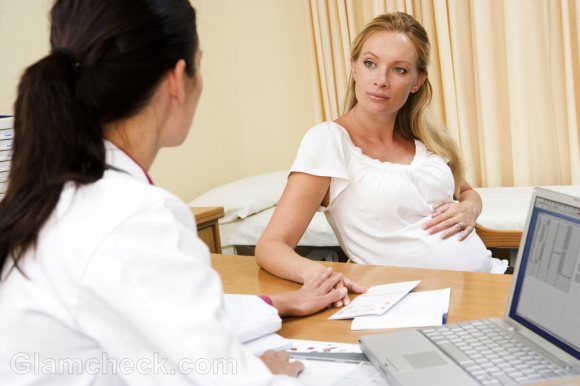If you are pregnant, then you probably get hundreds of tips and loads of advice from every woman you meet who has ever been pregnant or who knows someone who’s been pregnant. You probably also hear dozens of stories, even if you don’t ask to hear them. These kinds of informal interactions are how most women learn about pregnancy and childbirth. While this is a wonderful method of education, a lot of misinformation gets passed on from generation to generation simply by word of mouth. A great example of this is the period during pregnancy story.
 Many women will say that they get their period during pregnancy. In fact, some women do not even know they are pregnant for a few months because they experience bleeding as usual on the day they are expecting their period. But bleeding is not all that a period is about. When there is bleeding during pregnancy, it could indicate dozens of things, but it would be inaccurate to term it a period during pregnancy.
Many women will say that they get their period during pregnancy. In fact, some women do not even know they are pregnant for a few months because they experience bleeding as usual on the day they are expecting their period. But bleeding is not all that a period is about. When there is bleeding during pregnancy, it could indicate dozens of things, but it would be inaccurate to term it a period during pregnancy.
Can you get your Period During Pregnancy?
A period during pregnancy is impossible. And to understand why, you first need to be clear about what a period is and why it happens.
Every month, your body releases an egg into the uterus to be fertilized. If the egg is fertilized, it will attach itself to the uterine wall and this is where it will eventually develop into a baby. But if the egg is not fertilized, then the egg will be discarded by the body along with the lining of the uterine wall, which will break down and be thrown out of the body during your monthly bleeding. This is basically what your period amounts to. After your period, the wall of the uterus will grow a new lining, and when it is ready another egg will be released.
Now, when you are pregnant, there is nothing for the body to discard as the egg has been fertilized and it has implanted itself on the lining of the uterine wall. The body sends a signal to the brain to stop periods and focus its energies on the developing embryo. The body is designed to nurture the embryo and protect it. So it won’t make a ‘mistake’ or shed the uterine wall out of habit as the body is a highly sophisticated system. Since there is nothing for it to shed, there will be no bleeding. So it is impossible to have a period during pregnancy.
But what, you may ask, about all those women who swear that they have a period during pregnancy? They can’t all be lying. There has to be something behind that story, otherwise it wouldn’t get told so often and prevail for so long.
If it’s Not A Period During Pregnancy, Then What?
 Although you cannot have a period during pregnancy, you can experience some spotting or bleeding. This is normally misperceived as a period, but it actually is not.
Although you cannot have a period during pregnancy, you can experience some spotting or bleeding. This is normally misperceived as a period, but it actually is not.
Bleeding is quite common in the first trimester i.e. the first three months of your pregnancy and is normally seen as a period during pregnancy. Here are some reasons it may happen.
- As mentioned earlier, when the egg is fertilized it attached itself to the wall of the uterus. This is called an implantation. It occurs about 5 to ten days after the egg has been fertilized. While implantation is taking place, there may be a slight dislodging of bits of the uterine wall while the embryo (fertilized egg) is getting comfortable. These dislodged bits will exit the body through the vagina and will cause spotting for maybe a day or two. Since most women are unaware of this fact, they presume that they are having a period during pregnancy. And the bleeding will usually coincide on the day that you are expecting your period. But the spotting is very light, hardly like a normal period, and will go away on its own after a couple of days. But if it does not, then it may be an indication of something more serious and you should see your doctor.
- In the early stages of pregnancy, your body is adapting to accommodate the baby. There will be an increased flow of blood to your cervix. And this may result in some light bleeding. Again, quite normal for a few days. But see your doctor if it persists or if the bleeding is heavy.
- Postcoital bleeding may occur and be mistaken for a period during pregnancy.
- Bleeding occurs when you have an ectopic pregnancy. This is a rare but very dangerous condition in which the embryo grows outside the uterus. This happens when the fertilized egg attaches itself to the fallopian tube instead of the uterine wall.
- Bleeding could signify a miscarriage, especially if you also experience other symptoms like fever or cramps. It is easy to mistake this for a period during pregnancy because of PMS-like symptoms that accompany it.
- Another form of bleeding which causes women to think they are having a period during pregnancy is decidual bleeding. Usually occurring in the earlier stages of pregnancy, decidual bleeding is a result of hormonal changes in your body which cause the uterine lining to shed slightly, in turn resulting in slight spotting.
- Easily mistaken for a period during pregnancy, bleeding may occur due to a polyp in the cervix. This is not dangerous to mother or child, but it should be checked out.
- Some vaginal infections or STDs may also cause period-like bleeding during pregnancy.
- Any bleeding experienced during the second and third trimester is a cause for concern and almost always is a sign that something is seriously wrong. This is NOT a period during pregnancy and should not be taken lightly. See your doctor immediately.
 In conclusion, bleeding is common and can often be mistaken for a period during pregnancy. It is important that you inform your doctor of any type of bleeding so that she can examine you and conduct necessary tests to make sure everything is OK. If bleeding is accompanied by cramps, backache, fever, or chills, consider it an emergency situation and call a doctor immediately. Remember that although most causes for bleeding during pregnancy are normal and harmless, you should nevertheless have each instance investigated to discover the accurate cause.
In conclusion, bleeding is common and can often be mistaken for a period during pregnancy. It is important that you inform your doctor of any type of bleeding so that she can examine you and conduct necessary tests to make sure everything is OK. If bleeding is accompanied by cramps, backache, fever, or chills, consider it an emergency situation and call a doctor immediately. Remember that although most causes for bleeding during pregnancy are normal and harmless, you should nevertheless have each instance investigated to discover the accurate cause.
Image: Shutterstock
